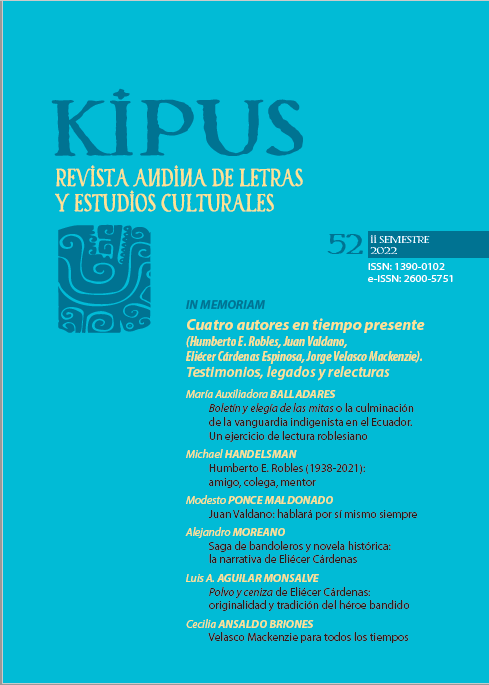Polvo y ceniza by Eliécer Cárdenas: Originality and Tradition of the Bandit Hero
DOI:
https://doi.org/10.32719/13900102.2022.52.4Keywords:
Ecuador, novel, bandits, Naún Briones, Eliécer Cárdenas, history, heroAbstract
Polvo y ceniza by Eliécer Cárdenas engenders the legendary and mythical figure of the bandit hero. The first circumstances with which the protagonist Naún Briones faces teach him that, due to his condition as a third-rate citizen, he must be limited and subjected to a deceitful and unjust world in which he has no possibility of improvement due to his social condition. There is no solution in sight for him through the path of the law. His only alternative is to follow the path of assault, robbery or murder; this violence does germinate a change, even if it means being outside the law and death lurks around any sinister shortcut. His person became glorified because his mission was to help the abandoned and miserable; he brought welfare and satiated the hunger of the needy. He became a robinhoodsian outlaw who ended up immolating himself for a cause, at the very least, questionable.
Downloads
References
Aguilar Monsalve, Luis A. 2013. Breve historia y crítica de los movimientos literarios en Hispanoamérica: del romanticismo al posmodernismo. Quito: Editorial Ecuador.
Aguilar Monsalve, Luis A. 2019. “Pablo Palacio y Virginia Woolf moderadores y pioneros de una psicología ambigua existencial dentro del vanguardismo”. Revista Memorias 75.
Cárdenas, Eliécer. 2001. Polvo y ceniza. Quito: Eskeletra.
Clouet, Richard. 1998. Robin-des-Bois: le hors-la-loi légitime des ballades médiévales. Lille: Editions du Septentrion.
Cruz Casado, Antonio. 2008. “El espejo infiel: una aproximación al bandolero romántico y su reflejo en la literatura española”. Iberoamericana. América Latina, España, Portugal: Ensayos sobre letras, historia y sociedad. Notas. Reseñas iberoamericanas 8 (31): 137-48. https://www.google.com/url?sa=t&source=web&rct=j&url=https://www.iai.spkberlin.de/fileadmin/dokumentenbibliothek/Iberoamericana/2008/Nr_31/31_Cruz.pdf&ved=2ahUKEwio3d2p2572AhVyVTABHfHkByEQFnoECBUQAQ&usg=AOvVaw1rKiFrwNoyfh5wHY5ibQLE.
Fee, Christopher R. 2011. Mythology in the Middle Ages: Heroic Tales of Monsters, Magic, and Might. Santa Barbara: Praeger.
García Lorca, Federico. 1927. Canción de jinete (1860). Málaga: Málaga Litoral.
Hunter, Joseph. 1862. “The Great Hero of the Ancient Minstrelsy of England, ‘Robin Hood’. His Period, Real Character, etc. investigated and perhaps ascertained by Joseph Hunter”. Critical and Historical Tracts, n.º 4. Londres: John Russell Smith.
Mendizábal García-Lavín, Federico. s. f. Historia de la literatura inglesa. Valladolid: Miñón S. A.
Miller, Dean. 2000. The Epic Hero. Baltimore: Johns Hopkins University Press. Rico, Francisco. 1980. Historia y crítica de la literatura española, vol. I, Edad Media. Barcelona: Crítica / Grijalbo.
Robinson Kelly, Molly. 2009. The Hero’s Place: Medieval Literary Traditions of Space and Belonging. Washigton D. C.: The Catholic University of America Press.
Rodríguez Puértolas, Julio, Carlos Blanco Aguinaga e Iris M. Zavala. 1978. Historia social de la literatura española [en lengua castellana], vol. 1. Madrid: Editorial Castilla.
Sacoto, Antonio. 1992. “Estudio introductorio”. En Polvo y ceniza. Colección Antares 88. Quito: Libresa.
Scott, (Sir) Walter. 2018. Ivanhoe. Madrid: Edimat Libros, S. A.
Torres Miguel, Ricardo. 2010. “El charro contrabandista: la figura del bandido social en Astucia de Luis G. Inclán”. Signos Históricos 12 (24): 45-63. https://www.researchgate.net/publication/262542049_El_charro_contrabandista_la_figura_del_bandido_social_en_Astucia_de_Luis_G_Inclan.
Vásquez, Juan Gabriel. 2021. Prólogo a García Márquez, Mario Vargas Llosa. Dos soledades. Un diálogo sobre la novela en América Latina. Bogotá: Penguin Random House Grupo Editorial, S. A.







.png)
